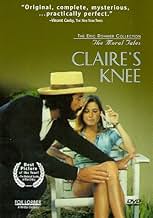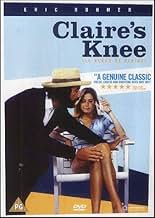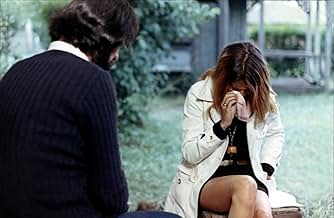On lakeside summer holiday, a conflicted older man is dared to have a flirt with two beautiful teenage half-sisters despite his betrothal to a diplomat's daughter and the fact that the girls... Read allOn lakeside summer holiday, a conflicted older man is dared to have a flirt with two beautiful teenage half-sisters despite his betrothal to a diplomat's daughter and the fact that the girls have boyfriends.On lakeside summer holiday, a conflicted older man is dared to have a flirt with two beautiful teenage half-sisters despite his betrothal to a diplomat's daughter and the fact that the girls have boyfriends.
- Awards
- 6 wins & 4 nominations total
- Director
- Writer
- All cast & crew
- Production, box office & more at IMDbPro
Featured reviews
Like most of Eric Rohmer's work, you will either enjoy the laid-back atmosphere and chatty characters in Claire's Knee, or find it all incredibly boring. I happen to love them. It's rare to find movies that don't want to be sensationalistic and violent, but would rather present universal questions and then investigate them throughout the course of the movie.
I would recommend Love in the Afternoon as an entry into Rohmer however, as it is a little more pacey for those unfamiliar with his style. And my personal favourite is "The Green Ray"... but don't start there as the subject of the film is about boredom!
I would recommend Love in the Afternoon as an entry into Rohmer however, as it is a little more pacey for those unfamiliar with his style. And my personal favourite is "The Green Ray"... but don't start there as the subject of the film is about boredom!
There's a lot to enjoy in Claire's Knee: the relaxed easy pace, the charming characters, the warm and insightful conversations, the stunning scenery of the French Alps.
Unfortunately I can't find any way to identify or empathize with a world that is so comfortable, so boring, so unambiguous, and ultimately, so superficial. None of the characters seem to work; no-one ever seems anxious or troubled; nothing particularly bad or good happens, or seems likely to ever happen. It's a film of low-level emotions, and low stakes -- for the characters, and for the viewers.
In this bland world, the only question of importance becomes: will the main character, a man of 35 or older, seduce one of the two teenage beauties? No particularly momentous moral calculus is involved, and ultimately the stakes were so low that I could not bring myself to care. The character is good man, or he's a lecher, or he's neither...but I feel Rohmer did not give me any reason why any of this might matter.
Claire's Knee is a hymn of praise to French charm, bourgeois comforts, and inconsequential easy pleasures. If that's your thing, enjoy yourself with this film. Me, I'll be over there in the corner, watching films by directors that ask harder questions.
Unfortunately I can't find any way to identify or empathize with a world that is so comfortable, so boring, so unambiguous, and ultimately, so superficial. None of the characters seem to work; no-one ever seems anxious or troubled; nothing particularly bad or good happens, or seems likely to ever happen. It's a film of low-level emotions, and low stakes -- for the characters, and for the viewers.
In this bland world, the only question of importance becomes: will the main character, a man of 35 or older, seduce one of the two teenage beauties? No particularly momentous moral calculus is involved, and ultimately the stakes were so low that I could not bring myself to care. The character is good man, or he's a lecher, or he's neither...but I feel Rohmer did not give me any reason why any of this might matter.
Claire's Knee is a hymn of praise to French charm, bourgeois comforts, and inconsequential easy pleasures. If that's your thing, enjoy yourself with this film. Me, I'll be over there in the corner, watching films by directors that ask harder questions.
I think the moral point of "Claire's Knee" (probably not Rohmer's) is that Jerome's conversion from womanizer to a serious and challenging relationship with Lucinde, is flawed. And that the flaw is his invoking the escape hatch of an "open marriage." He (or his new persona) half believes that he will not use it, but the accidental presence of two enticing teenagers at his Lake Annecy vacation sets the stage for his self-delusion, his devaluation of intimacy, and for the resurfacing of his sensuous ways.
For "open marriage" as a cover for "adult," is really another form of ambivalence and duplicity. What it means to Jerome is that the door of puerile fantasy is at his fingertips. Thus in the rarified air of Annecy, in the flow of summer, thin, mod teenagers Laura and Claire become not only sex objects to Jerome, but potential love partners--one at 16, assessed as adult enough, and the other 18, assessed as legal. We see them together, he invariably clothed for late autumn weather, they for mid-summer. In the emotional cat and mouse games that ensue, Laura and Claire are, to him, mere temptresses, and perhaps part of a self-test, and not, in any sense, young women with lives of their own & chosen boy friends. Instead, their boundaries begin to blur under his voyeurism, his not so subtle acts of aggression, his familiar touching, fondling, pointed remarks, and prescriptive suggestions. He offers them no affection, no friendship, and no communication.
How could it be otherwise given their demure youth, beauty and his permissive "open marriage," and when possessing them is his goal--pederasty and fetishism his means. But his fling with inspiring youth having fulfilled his KNEEDS, he can now discard Laura and Claire without in any way having deviated from his new mature male role-- as willfully possessive as he's been. Whether Lucinde has actually signed off on the "open" deal or not, she, despite her maturity, worldly success, and her sculptured character, must be no more than a symbol to Jerome, extracted for his KNEEDS, which must come first before commitment and support.
For "open marriage" as a cover for "adult," is really another form of ambivalence and duplicity. What it means to Jerome is that the door of puerile fantasy is at his fingertips. Thus in the rarified air of Annecy, in the flow of summer, thin, mod teenagers Laura and Claire become not only sex objects to Jerome, but potential love partners--one at 16, assessed as adult enough, and the other 18, assessed as legal. We see them together, he invariably clothed for late autumn weather, they for mid-summer. In the emotional cat and mouse games that ensue, Laura and Claire are, to him, mere temptresses, and perhaps part of a self-test, and not, in any sense, young women with lives of their own & chosen boy friends. Instead, their boundaries begin to blur under his voyeurism, his not so subtle acts of aggression, his familiar touching, fondling, pointed remarks, and prescriptive suggestions. He offers them no affection, no friendship, and no communication.
How could it be otherwise given their demure youth, beauty and his permissive "open marriage," and when possessing them is his goal--pederasty and fetishism his means. But his fling with inspiring youth having fulfilled his KNEEDS, he can now discard Laura and Claire without in any way having deviated from his new mature male role-- as willfully possessive as he's been. Whether Lucinde has actually signed off on the "open" deal or not, she, despite her maturity, worldly success, and her sculptured character, must be no more than a symbol to Jerome, extracted for his KNEEDS, which must come first before commitment and support.
one of the most beautiful movie by Rohmer. when I saw this film for the first time i was in Brasil (Saao Paulo) and the movie was whistled at the end of the performance by the assistance. In fact, I found the movie a little bit ridiculous and native. i reviewed this movie on TV, a few years later, in France, and was then enthusiastic. I've since become a fan of Rohmer and I've seen nearly all of his films.
This is one of the best movies of Rohmer's earlier series of moral tales. The movie wonderfully depicts the complicated relatioship between the hero and his desires, represented by Claire, and the reality of Claire's younger sister, who as masterfully played by Beatrice Romand. This is a wonderful comedy of manners, in which we can laugh at all the characters, how in their attempts to fool others, they only fool themselves. Rohmer has intricately plotted every action, I enjoyed every moment of the film.
Did you know
- TriviaNot counting a picture frame seen from a distance, the title character's first appearance takes place 47 minutes into the film.
- GoofsNear the end of the movie, Jerôme and Claire Annecy are going by boat to Annecy but must seek refuge under a shelter because of a storm. During their conversation, the irregular flow of the watering device used to create the big rain can be heard clearly.
- ConnectionsEdited into 365 Days, also Known as a Year (2019)
Details
Box office
- Gross worldwide
- $5,112
- Runtime
- 1h 45m(105 min)
- Sound mix
- Aspect ratio
- 1.37 : 1
Contribute to this page
Suggest an edit or add missing content

![Watch Bande-annonce [OV]](https://m.media-amazon.com/images/M/MV5BMTgyOTk2NmMtZTk3ZS00Yjg4LWIwMzEtM2RmZDQ0ZWVhZWUzXkEyXkFqcGdeQXRyYW5zY29kZS13b3JrZmxvdw@@._V1_QL75_UY281_CR10)

























